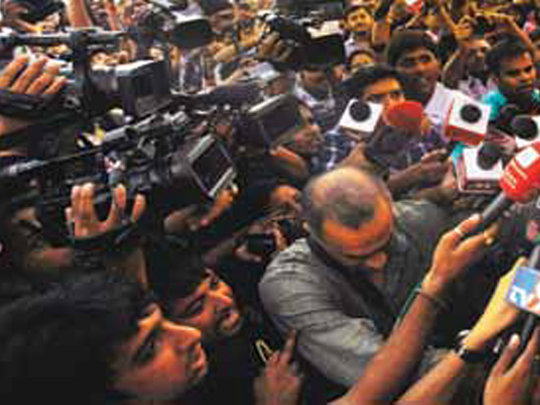
Dubai: Indian media has come under unprecedented gag as Modi fever grips the nation in the run-up to national elections starting on Monday. A number of editors have either lost their jobs or told to avoid writing stories critical of the Hindutva poster boy and prime minister hopeful Narendra Modi, media observers and journalists say.
“There’s an obsession to manage the message of Modi in order to ensure that the narrative doesn’t get diluted,” senior journalist Siddhartha Varadharajan told a TV discussion recently. Last October, Varadharajan had to resign as the editor of Hindu newspaper after he allegedly instructed news desk not to play up stories on Modi on the front page. Varadharajan denied passing any such instructions and said he only told the newsroom to publish content purely on editorial merit.
Varadharajan is not alone. In November, political editor of Open magazine, Hartosh Singh Bal, was sacked allegedly for the magazine’s anti-Modi tone. Two months later, Bal’s boss and managing editor Manu Joseph was also forced to resign. Days later, a journalist close to Modi’s colleague and senior Bharatiya Janata Party leader Arun Jaitley was appointed managing editor of Open. “The reason an owner can bypass an editor in this fashion is that over several decades, editors in the Indian media have been willing to let their position be undermined and the few editors such as Manu, who recently made their mark, have been unwilling to stand up to pressure when it really matters,” Bal wrote in an article on news portal Firstpost.com.
All three are vociferous critics of Modi and have openly questioned his record on anti-Muslim riots in Gujarat. Almost a year before his abrupt departure, Bal wrote this in Open: “It seems to me that to be true to my calling as a journalist, I must consider who gained and who lost out in Modi’s version of governance and politics. Travelling through Gujarat, the answer is obvious, as it is obvious in Modi’s own constituency, particularly, where he has selectively chosen not to engage with Muslim voters over the past decade.”
After his resignation, Joseph wrote in the New York Times: “The notion that Mr Modi, who belongs to the Bharatiya Janata Party, which has been the principal opposition in parliament for 10 years, is the answer to India’s woes has been propagated by the business community, which owns Indian journalism, and the urban middle class, which views the Indian National Congress as corrupt, inefficient and a reckless benefactor of the poor. The noise on social media, which is largely in favour of Mr Modi, contains the low-stakes patriotism of Indian residents of the United States who do not have to live through the consequences of their long-distance affair with nationalism. They tend to be liberal Democrats in the United States, but political conservatives in India.”
In February, popular TV journalist Thiru Veerapandian lost the prime-time show he anchored on Sun TV for 17 years after he made a remark against Modi off air. “I said people should remember that, if they voted for Modi, they might well have to live with that decision for the next 15 years,” he told Outlook magazine after his ouster.
Neutral ink
Modi mania is not limited to print alone. “All of a sudden, newspapers and television channels have become wary of offending Modi. He interacts with the media minimally and selectively. But his name is being breathed in talk about top-level editorial changes in some media houses. Reporters are being asked to pipe down; editors are losing their jobs; prime-time programmes are going off air; commentators are replacing vitriol with neutral ink while writing on Modi. Such is the ‘M’ effect on the media, some believe that proprietors and decision-makers are using it as a convenient handle to control editorial expression,” an Outlook magazine report stated in February.
Another target of Modi supporters was Raheel Khurshid, Twitter’s new head of news. Twitteratis backing Modi dug out Khurshid’s old tweets where he said Modi “oversaw murders for fun”. His head was demanded by collecting 5,000 signatures. Since then, Khurshid’s anti-Modi tweets have been erased.
In March, TV personality Sagarika Ghose, deputy editor of CNN-IBN, was instructed by her management to not post disparaging tweets about Modi, news portal scroll.in reported. “There’s a disturbing new trend in the Indian media of measuring objectivity and bias,” she told the portal.
Bobby Naqvi is the Editor of XPRESS, a sister publication of Gulf News.












